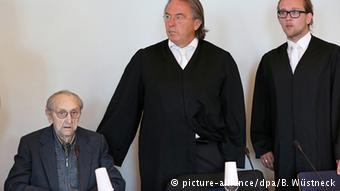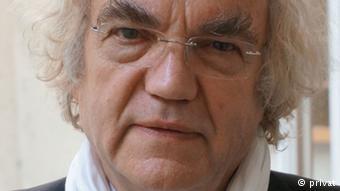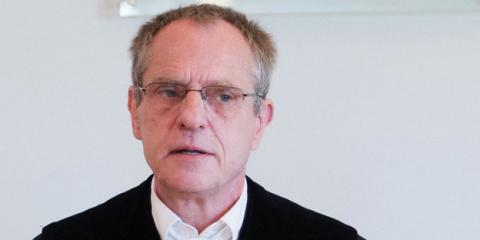Failed prosecution brings charge against judge in Nazi trial

95-year-old Hubert Zafke sits in a Newbrandenburg court with his lawyer Peter-Michael Diestel standing beside him.
By Carolyn Yeager
A JUDGE IN NEUBRANDENBURG IN GERMANY'S NORTHEAST IS ACCUSED of perverting the course of justice in one of the last Auschwitz trials brought by “holocaust survivors.” The charge has been brought by Jewish lawyer Thomas Walther, representing Walter Plywaski, 87, against Judge Klaus Kabisch. The lawyer for the accused former SS medic, 95 year-old Hubert Zafke, has defended the court's right to interpret the law as it sees fit, dismissing Walther's "media-friendly" criminal charges against Kabisch as a "provincial farce."
The prosecution's story goes that Walter and William Plywaski, aged 87 and 86, were brought to Auschwitz from Lodz, Poland, along with their parents on August 15, 1944. While they and their father survived, their mother was murdered in a gas chamber on the same day.
[Same old story that we know is not true. Their mother was separated from them, that is all. Men and women lived in separate camps in Birkenau. So this is just a fairy tale devised to make the brothers eligible to participate in the lawsuit.]
The two, now living in Boulder in the US state of Colorado, are "very, very disappointed by the court," Walther told German news service Deutsche Welle, "The fact that a German court is using all its power and energy to try and stop this tiny piece of justice - that's very, very difficult for him to understand. That's why I have today once again filed a motion rejecting this court on the grounds of suspected bias," Walther said.
 Walther, left (yes he really is this ugly) also represented “holocaust survivors” at the trial of Oskar Groening in Lüneburg in 2015. Now he is going after Zafke, who worked as a medic for the SS at Auschwitz from August 15 to September 14, 1944.
Walther, left (yes he really is this ugly) also represented “holocaust survivors” at the trial of Oskar Groening in Lüneburg in 2015. Now he is going after Zafke, who worked as a medic for the SS at Auschwitz from August 15 to September 14, 1944.
But the Neubrandenburg court has so far denied the Plywaski brothers' right to be co-plaintiffs at the trial on the grounds that they were not on one of the 14 Auschwitz trains listed on the charge sheet.
Walther says this is immaterial. "The period of time is the decisive point," he said. "It's not as if only the people who were on those 14 trains count as victims. If someone was murdered in this time period, the children are entitled to be co-plaintiffs."
[But if their mother was not murdered they have no business being plaintiffs. They clearly have not proven she was – just saying so is taken as enough in a German court of law!]
Walther also complains that a higher regional court in the state of Mecklenburg-Western Pomerania three times ordered Judge Kabisch to accept the Plywaski brothers as co-plaintiffs - and each time he opposed the decision, delaying proceedings.

Judge Klaus Kabisch listened to doctors who often said Zafke was not fit to appear in court because of high blood-pressure and depression.
Kabisch also continuously delayed Walther's routine requests - such as granting him access to relevant files, or translating the charge sheet into English so that the plaintiffs could read it. The Neubrandenburg court also denied Walther the costs to travel to the US to speak to his client in person, he says.
An open letter to the Neubrandenburg court [Judge Kabisch], attached to an online petition, by a group of “holocaust researchers and political observers” [Nazi hunters from the SimonWiesenthal Center?] said:
"It is obviously not clear to you that international public opinion [what international public opinion? There is none except Jewish and communist opinion] is getting the impression that you consider this trial to be so beyond the pale, for political or other reasons, that you are determined to prevent or sabotage it. You fail to recognize the explosive nature of the actions and thus perpetuate the decades-long practice of non-prosecution of Nazi perpetrators."
In return, Zafke's attorney, Peter-Michael Diestel, released a statement of his own on Monday, defending the court's right to interpret the law as it sees fit and dismissing Walther's "media-friendly" criminal charges against Kabisch as a "provincial farce:"
"You exhaust all the legal options, but if you lose that's the way it is, You can't then file criminal charges against the judge. We're seeing a show trial that is failing because of extremely simple procedural problems. There's no special law for Nazi trials. It's a very normal procedure, and it was extremely badly prepared by the prosecution."
It was only with the conviction of Sobibor guard John Demjanjuk in Munich in 2011 that working at a Nazi so-called 'death camp' was deemed sufficient for an accessory to murder conviction. Since then, German prosecutors have been searching for other former Auschwitz guards able to stand trial - so that they can correct what they now consider to be prior failure by the German judiciary.
Category
Germany, Holocaust Industry Exposed, Law & Government, News- 499 reads









